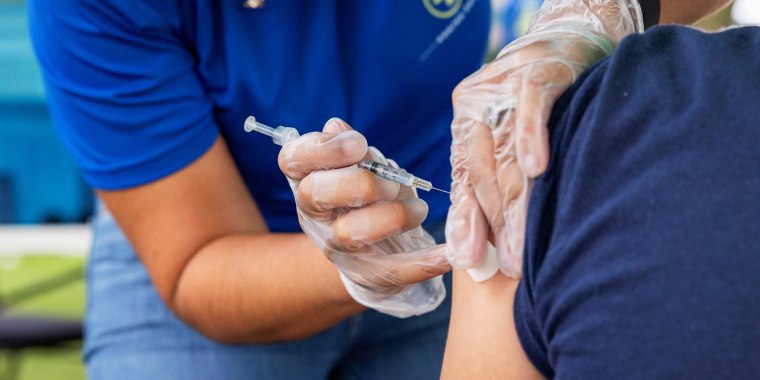The COVID-19 vaccines continue to offer strong protection against severe illness and hospitalization, according to research on more than 1 million people published Wednesday in The Lancet Infectious Diseases.
The findings come as the United States prepares to begin offering booster shots to all Americans later this month — a decision driven in part by data federal officials have said indicates the vaccines' ability to curb infections may be waning.
But protection against the most severe forms of the disease appears to be holding up.
The new research shows the vaccines are keeping people out of the hospital and the intensive care unit and are preventing deaths, said Dr. Paul Offit, director of the Vaccine Education Center at Children’s Hospital of Philadelphia, who was not involved with the study.
That's "the goal of these vaccines," he said, adding that the findings apply to "people of all ages and co-morbidities," even amid the spread of the highly contagious delta variant.
In the Lancet study, researchers in the United Kingdom analyzed data from a project called the ZOE COVID Study, where users report symptoms, vaccination status and other demographic information daily via an app.
The researchers looked at data collected on more than 1 million people from December 2020 through July 2021, a period that spanned both the alpha and delta variant waves in the U.K. Participants received two doses of either the Pfizer-BioNTech, Moderna or AstraZeneca vaccine.
Overall, less than 0.2% of the participants reported a breakthrough infection, with such cases more likely in people already considered to be vulnerable, including older adults or people with underlying illnesses.
When breakthrough infections did occur, most were mild — just 6% of people with breakthrough infections reported symptoms. What's more, vaccination was shown to cut the risk of hospitalization by more than two-thirds.
Two other studies published Wednesday also found an extremely low rate of breakthrough infections.
The first, published in JAMA Network Open, analyzed breakthrough infections among more than 5,300 vaccinated health care workers in Israel. Just 27 such infections were found. No deaths were reported, and just one patient required hospitalization. The study, however, was completed prior to the delta variant becoming the dominant strain in Israel.
The other, published in the New England Journal of Medicine, detected 94 symptomatic breakthrough infections out of more than 16,000 health care workers. That study, which ran through July, found that breakthroughs increased as the delta variant grew dominant.
'Like a guard dog'
Since the COVID-19 vaccines were rolled out in late 2020, researchers have been fastidiously tracking breakthrough infections.
That breakthrough infections occur does not mean the vaccines are not working. Rather, experts say, breakthrough infections were always expected, because no vaccine is 100% effective.
"Vaccines are like a guard dog," said Dr. Rachel Presti, an infectious disease physician at Washington University in St. Louis. A guard dog will ward off most burglaries, but it's possible that a thief could still manage to sneak by.
The initial Phase 3 clinical trial results on the first two vaccines authorized in the U.S. set an incredibly high bar, with Pfizer-BioNTech reporting a 95% efficacy and Moderna reporting a 94% efficacy against symptomatic illness.
That tremendous success may have inadvertently led to unrealistic expectations of the vaccines, said Dr. Abinash Virk, an infectious disease specialist at the Mayo Clinic in Rochester, Minnesota.
“I think that people in general thought that, ‘I got the vaccine, I should never get an infection. I should be protected 100%,’” Virk said.
The measles-mumps-rubella vaccine is considered the most effective vaccine in existence, preventing 97% of measles cases.
But part of why that vaccine works so well is that the measles virus is no longer circulating widely, so there's far less opportunity for a vaccinated individual to be exposed and an even smaller likelihood of a breakthrough infection.
"Vaccines work better when there's less virus circulating," Presti said.
According to Centers for Disease Control and Prevention data, community transmission is currently considered high in 94% of U.S. counties.
Both the JAMA Network Open and the New England Journal of Medicine studies also found that breakthrough infections were more commonly contracted in the home, despite the health care workers spending their days around Covid cases in hospitals.
"When we're working in the hospital, we are very conscious about exposure," Virk said. "We're letting our guard down when we are at home."
That people are more susceptible when they're not wearing masks or physically distancing is not surprising, Virk said, nor should it be discouraging. Rather, it shows that adding layers of protection can enhance the potency of the vaccines.
“What we’re hearing more and more is that [vaccinated health care workers] are getting infected after their children, who are ages 12 or less get infected,” said Dr. Francesca Torriani, an infectious diseases specialist at UC San Diego health and lead author of the New England Journal of Medicine study.
"The good news," she said, "is that these infections are still very mild."
This story first appeared on NBCNews.com.
